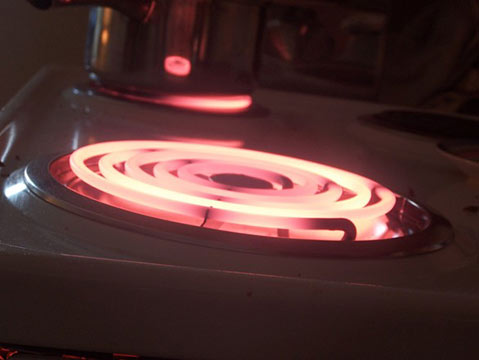Going Electric in the Kitchen

Most of you are probably too young to remember the “Gold Medallion” homes of the 1960s. These modern, state-of-the-art, all-electric homes were promoted as the best and cleanest homes on the market. Within a few years, as electricity costs increased, they became the Edsels of the housing market. However, I have come to believe that after a 50-year hiatus, all-electric homes are once again going to be the future. The reasons are quite different: Combined with solar-generated electricity, either on- or off-site, such homes can free us from fossil-fuel use.
The Energy Star label, a federal program that rates the energy efficiency of appliances, enables shoppers to knowingly purchase appliances that use the least energy to operate. Created in 1992, the program now covers 40,000 products and saves more than $24 billion (2012) in energy costs annually.
One energy-efficient electrical appliance that has been widely embraced in Europe and Asia is the magnetic-induction cooktop. Because it directly heats a pan using magnetic fields, an induction unit can provide great power, instant adjustability, excellent thermal efficiency, and precise control — equal to or better than gas or electric resistance cookers. The energy efficiency of induction coils is approximately double that of gas burners — roughly 80 percent of the energy in the electricity gets used for cooking compared to 40 percent of the energy in gas.
Since the pot is heated directly, the cooking surface, usually a glass ceramic sheet, doesn’t get warm except directly under the pot. Even there it gets only moderately hot, making for a safer cooking environment and easier cleanup — basically, no more burned fingers, no more baked-on spills, and less risk for children.
One concern I had was possible radiation exposure, but after looking at the scientific literature, mostly European studies, I became convinced that there are no radiation-associated hazards. On the plus side, indoor air quality is significantly better than with gas stoves. There aren’t any incompletely combusted residual gases that accompany all gas units, a definite health hazard.
In the past, higher prices were a drawback, but in recent years, prices have come down to be competitive with gas ranges.
Until five years ago, I thought I would never cook on anything but a gas range. None of the other options offered the control and power of a gas flame. Now, with my induction stove top (run off solar), I have changed allegiance. Water boils three times faster, temperature adjusts instantly, it is safer, and it cleans up easier. I am a fan!
Dennis Allen is chair of Allen Construction, an employee-owned company committed to building and operating sustainably. He also serves as chair of the Dean’s Council at the Bren School of Environmental Science & Management at UCSB and as a boardmember of the Community Environmental Council.



